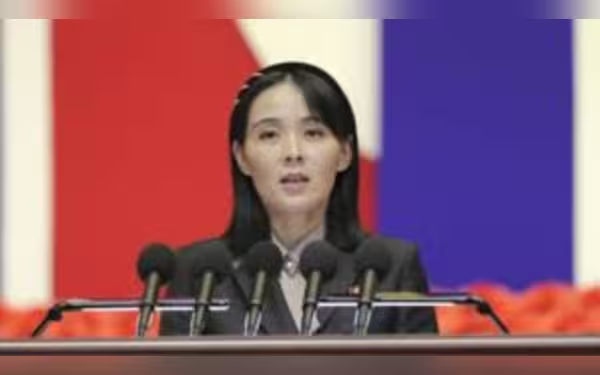Saturday, November 16, 2024 07:33 PM
Kim Yo Jong Criticizes US Nuclear Submarine Deployment in South Korea
- Kim Yo Jong condemns US nuclear submarine presence.
- Tensions rise on the Korean Peninsula.
- Trilateral summit planned to address North Korea's threats.
 Image Credits: thefrontierpost
Image Credits: thefrontierpostKim Yo Jong criticizes the US for increasing threats with its nuclear submarine in South Korea, escalating tensions on the Korean Peninsula.
In recent developments, tensions on the Korean Peninsula have escalated following the arrival of a US nuclear submarine in South Korea. This situation has drawn sharp criticism from Kim Yo Jong, the influential sister of North Korean leader Kim Jong Un. According to state media KCNA, Kim Yo Jong expressed her discontent, labeling the submarine's presence as a clear indication of the United States' intentions to "bring out its nuclear strategic assets, show off its strength and increase threats." This statement underscores the ongoing friction between North Korea and the United States, particularly in the context of military posturing in the region.
The USS Vermont, a Virginia-class nuclear submarine, docked at a naval base in Busan on Monday. The purpose of this visit was to resupply the vessel and provide the crew with a much-needed break. This move has not gone unnoticed, especially in light of recent discussions among the foreign ministers of South Korea, the United States, and Japan. During their meeting, they expressed serious concerns regarding North Korea's recent announcements about its uranium enrichment capabilities and its ongoing military cooperation with Russia, which they deemed "unlawful." The trio of nations has agreed to work towards organizing a trilateral summit by the end of this year, aiming to address these pressing issues.
Kim Yo Jong's remarks reflect a broader narrative of distrust and hostility that has characterized North Korea's relationship with the US and its allies. The North Korean regime often perceives military activities by the US as direct threats to its sovereignty and security. This perception is further fueled by the historical context of the Korean War and the ongoing military exercises conducted by the US and South Korea, which North Korea views as provocative.
As the situation unfolds, it is crucial for the international community to monitor these developments closely. The presence of nuclear assets in the region raises significant concerns about the potential for conflict. Diplomatic efforts will be essential in de-escalating tensions and fostering a more stable environment in East Asia. The hope is that through dialogue and cooperation, nations can work towards a peaceful resolution, ensuring that the specter of nuclear confrontation remains a distant concern rather than an imminent reality.













